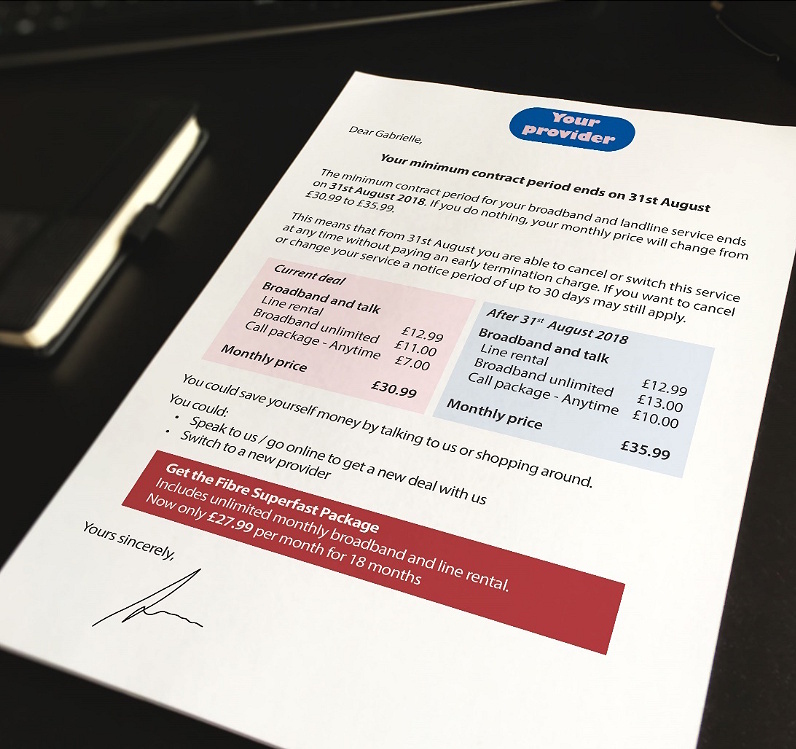Ofcom Probes UK Broadband ISP Prices and Tries to Boost Take-up UPDATE
The UK telecoms regulator has today launched a new review of broadband pricing to examine whether loyal (existing) and vulnerable ISP customers are being ripped-off. On top of that they’ve also set out their final proposals for end-of-contract notification letters, which will soon also tell you about the best deals.
Today’s announcement is designed to support the regulator’s new “Boost Your Broadband” campaign, which is centred around the launch of a basic information site that encourages consumers to take-up a “superfast broadband” (30Mbps+) or faster service. At present superfast networks are available to 94%+ of premises but we estimate that around 40% of lines are still on slow ADSL connections.
A number of factors tend to impact take-up, such as the higher prices charged for faster speeds, as well as customers being locked into long contract terms with their existing ISP and a lack of general awareness (i.e. locals may not know that a faster option exists) or interest in the new connectivity (i.e. if you have a decent ADSL2+ speed and only basic needs then you might feel less inclined to upgrade).
Advertisement
Otherwise Ofcom’s new website is sadly far from perfect, not least because its vague broadband speed checker doesn’t always seem to reflect the presence of alternative network (altnet) providers. In addition, it returns performance estimates for FTTC and ADSL2+ lines that often seem quite overly optimistic.
On other pages they also direct users toward Ofcom’s own accredited price comparison sites, none of which list any alternative network ISPs that may be available in your area or even show the latest “ultrafast broadband” (G.fast, FTTP) packages; except from Virgin Media of course. Some of their information and guidance is thus misleading.
On top of that we have some concerns about trying to boost take-up just before Christmas, which is a time of year when ISPs are already under strain due to the holiday period (low staffing) and related seasonal delays.
Broadband Price Review (Loyalty Penalty)
Over the past few months we’ve heard a lot about “loyalty penalties,” which is a general reference to how broadband ISP customers who remain with their provider and don’t haggle for a better price (i.e. after their minimum contract term has ended) will often end up paying more than new customers (i.e. only new customers benefit from discounts that are designed to attract them).
Advertisement
Such pricing and special offers are fairly normal for any aggressively competitive market, although not all ISPs are clear about how much you’ll pay post-contract (minimum term). The issue has become such a hot topic that the Competition and Markets Authority (CMA) recently opened a “super complaint” to examine the matter and determine whether vulnerable consumers need more protection (here).
In response Ofcom has today launched a new review of broadband companies’ pricing practices (here), which it says will “examine why some customers pay more than others, and whether vulnerable customers need extra protections to ensure they get a good deal.”
However it’s important to highlight that not all ISPs adopt the same model and many smaller providers, which may also offer advanced features (static IP etc.) and better service quality, simply charge a set monthly fee that rarely ever changes.
A few providers, such as TalkTalk, also offer an alternative approach by enabling existing customers to re-contract on to a lower price point than their standard rate. Alternatively it’s possible that a bit of haggling could save you a lot of money (see our Retentions Tips article) but only about 10% of consumers seem to ever do this (if you’re happy with the service then give negotiation a try first).
Advertisement
End of Contract Notifications
Ofcom has already proposed to tackle some of this by forcing broadband ISPs to issue End of Contract Notifications to existing subscribers (usually between 10-40 days before the end of your contract). This letter or email will include the end date of your current minimum term, details on the current package and what you’ll be paying if you stay etc.
Providers will also be required to send a one-off out-of-contract notification to all existing customers whose initial contract term has ended, and who weren’t given this information at the time. The notification itself would contain details of any changes to their price or services and let them know their options (upgrades, discount deals etc.).
Interestingly Ofcom initially said that this measure would not apply to those on shorter contract terms (i.e. less than 6 months), although in order to align with related EU rules this has now been removed. However the regulator does state that packages on 30 day rolling contracts won’t need to send notifications, which makes sense.
Example Notification (Article Continues Below)

Best Deal Alerts
On top of the new notifications, Ofcom has today proposed that all customers should also receive information on the best tariffs providers have available at the end of their fixed commitment period (on a mobile plan this must include at least one SIM-only deal for customers on bundled handset and airtime contracts).
This would also include information on any discounts available to new customers to ensure that customers are made aware of these deals and can see if they are losing out and should think about switching. In addition, all customers who remain out-of-contract will be “given information about their contract and their provider’s best tariffs.”
The new notifications would be annual and apply to broadband, mobile, landline phone and Pay TV providers. Ofcom said they will all have to “tell customers about their best available deal, both when their deals are coming to an end, and every year after that if they don’t change their deal.”
Sharon White, Ofcom CEO, said:
“We’re concerned that many loyal broadband customers aren’t getting the best deal they could.
So we’re reviewing broadband pricing practices and ensuring customers get clear, accurate information from their provider about the best deals they offer.”
Margot James MP, UK Digital Minister, said:
“Our rollout of superfast broadband is reaching thousands more homes and businesses every week and millions of people across the UK can now enjoy the clear benefits that superfast broadband provides. This is a welcome, positive step by Ofcom and I urge people to visit the website, check what services are available in their local area and then see if they can get a better deal.”
Ofcom said they will be consulting on the revised plans for customer alerts until 1st February 2019 and the new rules would then come into force during the second half of 2019 (i.e. after a 6 month implementation window), although they haven’t yet set a firm date for the outcome of the new pricing review.
We hope that the review will at least require ISPs to make their post-contract prices clearer, not least because at present we still see far too many that try to hide such details away in the small print or don’t tell you about it until you’ve already started the order process.
Furthermore we wouldn’t be surprised if vulnerable consumers (e.g. pensioners), who rarely change service and thus are less likely to benefit from any discounts, receive some additional protection. A precedent for this has already been set after Ofcom nudged BT to slash the cost of phone line rental by £7 to those customers who only took a phone service (here).
One final point worth making is that Ofcom’s drive to boost the take-up of faster broadband will no doubt assist the Government’s Broadband Delivery UK programme, specifically it’s gainshare / clawback clause. Suppliers (Openreach, Gigaclear etc.) for that are required to return part of the public investment when take-up in the intervention area rises above a certain level (e.g. 20%), which can be reinvested to boost coverage. BT alone has already provisionally set aside £712 million (here).
https://vimeo.com/305964218
UPDATE 8:41am
The first comments have arrived.
Tristia Harrison, TalkTalk CEO, said:
“We welcome Ofcom action to stop providers penalising loyalty. Two years ago, TalkTalk took a stand against unfair pricing. We reduced prices for existing customers with the launch of new plans and started proactively contacting those approaching the end of their contract, encouraging them to re-sign to cheaper deals.
In two years, we have lowered the gap between what new and existing customers pay to just £1-2 per month, whilst the average gap in the rest of the market has grown to £13-15. If the market won’t follow TalkTalk’s lead voluntarily, it might be time for regulation that enforces fairer pricing.”
Katie Milligan, Openreach MD for Customer, Commercial & Propositions, said:
“More than 17 million homes and businesses could order a better service over our network today, but haven’t yet. That means they’re missing out on more reliable connections that would allow them to work from home more effectively, access entertainment and use multiple smart devices around the house, all at the same time and without interruption.
At Openreach, we’re committed to playing our part in upgrading the country onto better broadband. One of the ways we’re doing that is by offering long-term price reductions for our wholesale fibre broadband products, which we hope will encourage providers to upgrade their customers onto the faster, more dependable services we’ve built. We would encourage customers to get in touch with their providers today and discover what might be on offer in their area.”
Adrian Baschnonga, EY’s Telecoms Lead Analyst, said:
“Clearer information about broadband packages and pricing is good news for consumers. Introductory offers can confuse as much as attract customers, and complex bundles work against a smooth decision-making process. Ensuring that consumers feel more confident engaging with broadband packages will help unlock demand for the very latest services on the market.”
Greg Mesch, CEO of CityFibre, said:
“It is right for Ofcom to start to address problems created by a lack of impartial information available to broadband customers. It has never been more important to make sure that consumers are empowered to make an informed choice as we strive towards full fibre as standard by 2033. However, it is clear that barriers remain if consumers are still putting up with paying more for sub-standard services.
Ofcom should now expand the scope of this campaign to address the mis-selling of ‘fibre’ broadband. The failure of the ASA to address this and to allow advertisers to wrongly mislead customers into paying more for a ‘fibre’ service that is in fact delivered to their home over legacy-copper networks is perpetuating confusion, and Ofcom needs to step in to help consumers make an informed choice.”
UPDATE 17th Dec 2018
Budget ISP Direct Save Telecom has complained that Ofcom is doing a disservice to consumers, not least by directing them toward sites that only list a small section of the market.
Stavros Tsolakis, Chairman of Direct Save Telecom, said:
“It appears that the Ofcom announcement only really serves to promote Which? and the handful of comparison sites with this pointless accreditation. Ofcom are right in what they are saying – consumers are paying too much for their broadband.
The consumers own supplier may not provide the best possible deal in the market but there are suppliers out there who offer the same service for a better price. But if the very sites Ofcom promote do not provide the consumer with the best deals, we want to know how will this ever be possible?”
Mark is a professional technology writer, IT consultant and computer engineer from Dorset (England), he also founded ISPreview in 1999 and enjoys analysing the latest telecoms and broadband developments. Find me on X (Twitter), Mastodon, Facebook, BlueSky, Threads.net and Linkedin.
« Openreach Start SOGEA Pilot and Reveal Standalone Broadband Prices















































Comments are closed